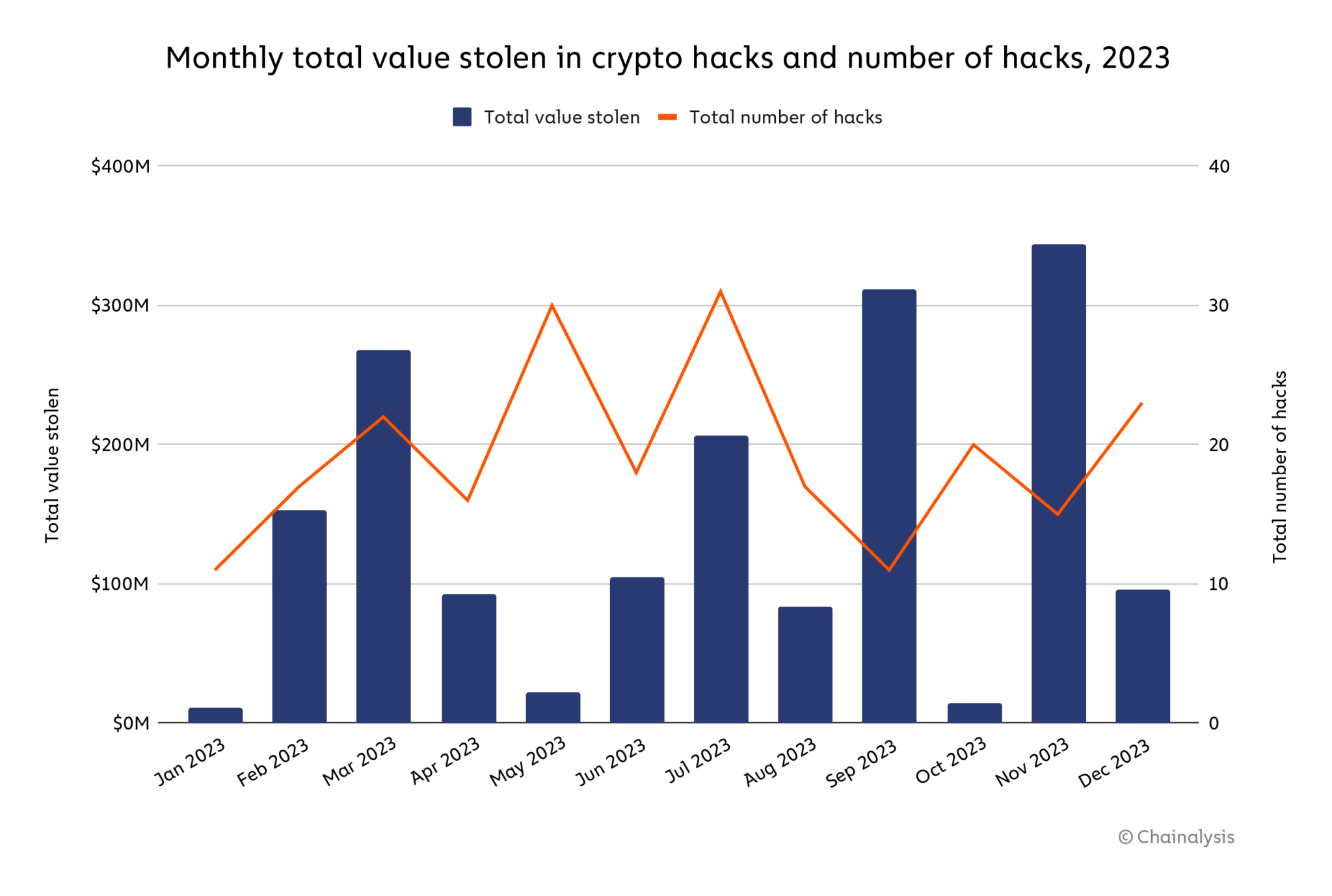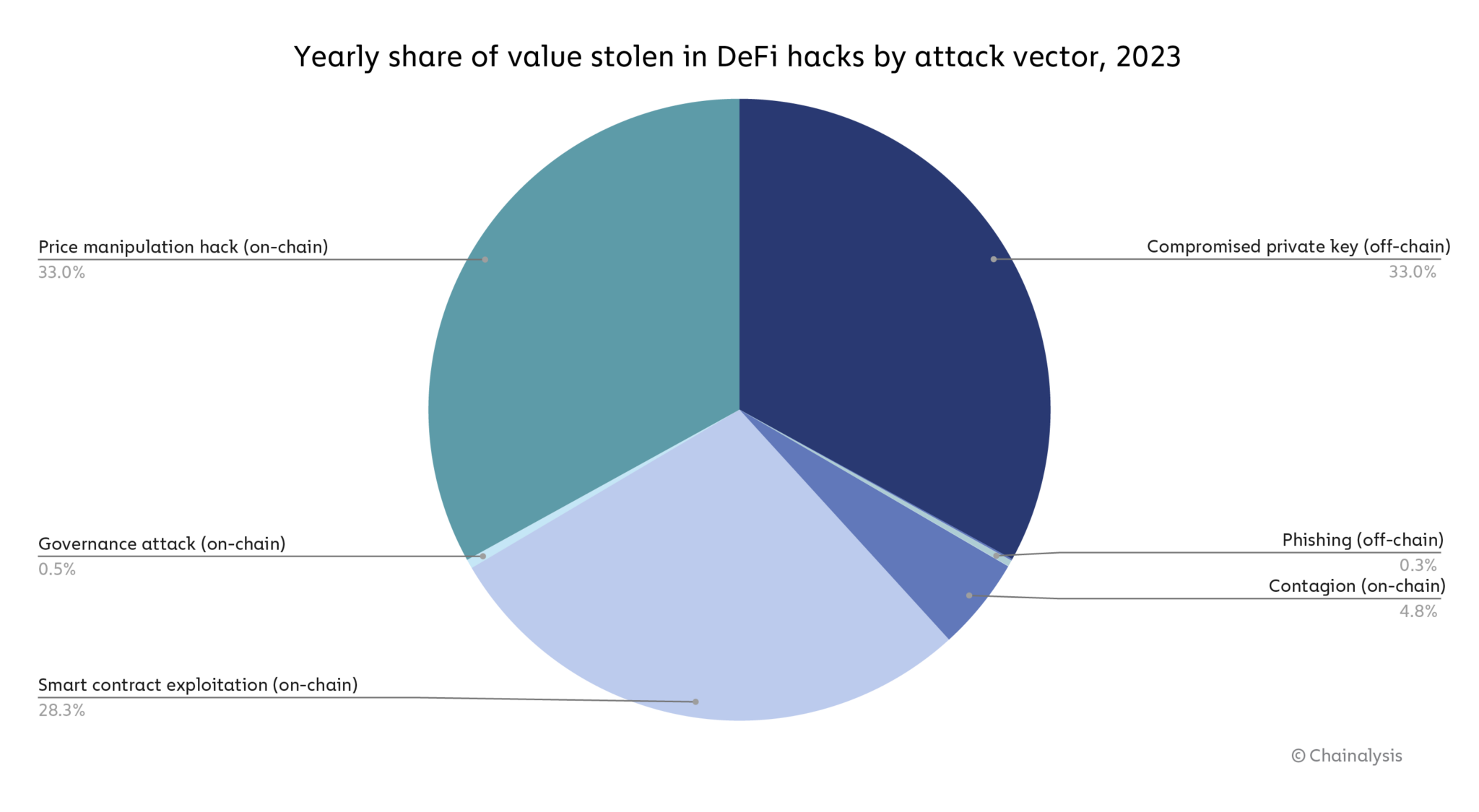North Korea's Crypto Hacking Hits Record High in 2023, Chainalysis Report Reveals
North Korea-linked hackers, known for their cyber-espionage activities, saw an increase in the number of hacks in 2023, reaching a record 20 incidents. Despite the rise in the number of hacks, the total amount stolen decreased to slightly over $1.0 billion from the 2022 high of $1.7 billion.

A new report from Chainalysis has unveiled that North Korea-linked hackers targeted a total of 20 cryptocurrency platforms in 2023, marking the highest level recorded between 2016 and 2023. The blockchain analytics firm reported that North Korea-affiliated hackers stole slightly over $1 billion worth of crypto assets in 2023, a decrease from the $1.7 billion stolen in the previous year.

DeFi hacking losses saw a remarkable 63.7% YoY decrease, amounting to $1.1 billion in 2023, down from $3.1 billion in 2022. Despite the overall drop, specific DeFi protocols experienced significant breaches. Euler Finance and Curve Finance were among the victims, facing flash loan attacks and thefts amounting to $197 million and $73.5 million, respectively.

The rise in North Korea's hacking activity has been observed in recent years, with cyber-espionage groups such as Kimsuky and Lazarus Group employing various malicious tactics to acquire large amounts of cryptocurrency assets. The FBI had previously attributed a $100 million crypto heist on the Horizon bridge in 2022 to North Korea-linked hackers.
Halborn, a security company specializing in web3 and blockchain solutions, collaborated with industry experts to analyze DeFi hacking trends in 2023. The study classified attack vectors into two categories: on-chain and off-chain, providing insights into the sophisticated methods employed by cybercriminals.
On-chain attack vectors exploit vulnerabilities in blockchain components, such as smart contracts, while off-chain vectors stem from vulnerabilities outside the blockchain. The analysis revealed that both on-chain and off-chain vulnerabilities, including compromised private keys, price manipulation hacks, and smart contract exploitation, contributed to hacking losses in 2023.
Funds Stolen from Crypto Platforms Fall Over 50% in 2023, Yet Hacking Threat Persists with Increased Incidents
Cryptocurrency platforms witnessed a notable decline in stolen funds during 2023, with a reduction of approximately 54.3% to $1.7 billion compared to the record-breaking $3.7 billion stolen in 2022. Surprisingly, the number of individual hacking incidents rose from 219 in 2022 to 231 in 2023. The decline in stolen funds was primarily attributed to a significant drop in decentralized finance (DeFi) hacking, which drove the surge in crypto theft in previous years.
DeFi hacking losses saw a remarkable 63.7% YoY decrease, amounting to $1.1 billion in 2023, down from $3.1 billion in 2022. Despite the overall drop, specific DeFi protocols experienced significant breaches. Euler Finance and Curve Finance were among the victims, facing flash loan attacks and thefts amounting to $197 million and $73.5 million, respectively.
Halborn, a security company specializing in web3 and blockchain solutions, collaborated with industry experts to analyze DeFi hacking trends in 2023. The study classified attack vectors into two categories: on-chain and off-chain, providing insights into the sophisticated methods employed by cybercriminals.
On-chain attack vectors exploit vulnerabilities in blockchain components, such as smart contracts, while off-chain vectors stem from vulnerabilities outside the blockchain. The analysis revealed that both on-chain and off-chain vulnerabilities, including compromised private keys, price manipulation hacks, and smart contract exploitation, contributed to hacking losses in 2023.
Interestingly, the drop in DeFi hacking losses could be attributed to improved security measures implemented by DeFi protocols. While the overall crypto market activity decline might have played a role, the relative reduction in on-chain vulnerability-driven hacking suggests advancements in smart contract security.
DeFi platforms were targeted, with losses amounting to approximately $428.8 million. Notable attacks on non-custodial cryptocurrency wallet service Atomic Wallet, attributed to North Korea-affiliated hacking group TraderTraitor, contributed to this decrease.
The study emphasized the importance of crypto platforms promptly addressing exploits, enabling law enforcement agencies to initiate seizure actions and gather information from involved services. As the crypto industry becomes more adept at responding to cyber threats, it is anticipated that the decline in funds stolen from crypto hacks will persist, fostering a more secure ecosystem.




